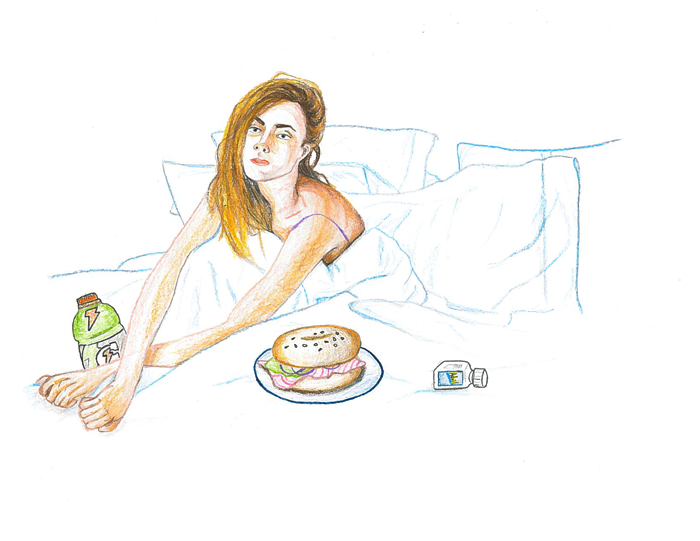With 77 per cent of drinkers reporting that they suffer from hangovers, wasting a weekend morning that was meant to be spent studying because of a splitting headache and nausea is no uncommon occurrence. While there is still no magical cure, scientists are coming closer to understanding the science behind the phenomenon that afflicts many of the McGill population.
“What happens when you drink alcohol is that it gets metabolized by the liver and converted to acetaldehyde,” Dr. Ariel Fenster, professor in McGill’s Department of Chemistry, explained.
Acetaldehyde is a carcinogenic compound that is toxic to the body. While acetaldehyde can be broken down into acetic acid during excessive drinking—which is then further broken down into carbon dioxide and water—the enzyme that converts acetaldehyde to acetic acid is in short supply.
“If the concentration of this enzyme […] is not very high, then there will be a [buildup] of acetaldehyde in the body, which [can be] really nasty,” Fenster said.
Acetaldehyde toxicity is the primary cause of headaches and nausea the morning after heavy drinking.
In the bloodstream, alcohol is also a diuretic which inhibits the pituitary gland from producing vasopressin. Without this hormone, the kidneys send water directly to the bladder rather than reabsorbing it into the body. The result is the frequent urination that many experience when they drink a lot, as well as the subsequent dehydration.
The dry, leathery tongue many people wake up with after excessive drinking is the body’s way of indicating that it’s extremely dehydrated. The diuretic effect of alcohol is also responsible for the expulsion of ionic salts, which, in combination with alcohol’s ability to break down and remove important energy stores in the liver, manifests itself in weakness, fatigue, and a general lack of coordination during a hangover.
“But it’s not just the alcohol [that causes hangovers],” Fenster said. “One of the major causes of hangovers is a class of chemicals known as congeners. Congeners are a chemical generated at the same time as [ethanol] in the fermentation process [.…] The higher the concentration of congeners, the worse a hangover you will have. The greater the age and the darker the colour [of the alcohol], the higher the concentration of congeners, and therefore, the worse the hangover.”
Drinking cognac or a dark rum, for example, would likely produce a worse hangover than drinking the same amount of white wine or vodka.
To avoid the productivity-killing effects of a hangover, there are numerous drinking guidelines that tend to be drilled into first-years as they enter McGill and university life. Eating a heavy meal before going out, drinking plenty of water throughout the night, and not drinking anything at least 90 minutes before going to bed are all key. Additionally, as Fenster explained, there is some validity to the old saying, ‘beer before liquor never been sicker.’ The carbon dioxide in beer or other carbonated beverages causes alcohol to be more readily absorbed.
“If the beverage you drink is carbonated, it is more quickly absorbed,” Fenster said. “You’re going to get sick faster with champagne than with the same intake of white wine, for instance.”
The best way to avoid a hangover, though, is the most obvious one.
“The key is really to drink in moderation, to space your drinking,” Fenster said. “General common sense is the best way to express it.”








